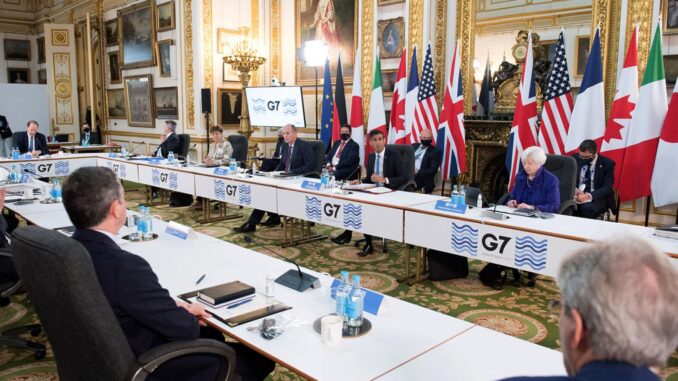
London (CNN)Group of Seven finance ministers gathering in London agreed Saturday to back a global minimum tax of at least 15% on multinational companies. The G7 group also agreed that the biggest companies should pay tax where they generate sales, and not just where they have a physical presence.
UK finance minister Rishi Sunak announced the agreement in a video posted on Twitter Saturday, saying G7 finance ministers — hailing from Canada, France, Germany, Italy, Japan, the UK and the US — had”reached a historic agreement to reform the global tax system to make it fit for the global digital age and, crucially, to make sure that it’s fair so that the right companies pay the right tax in the right places.”
The agreement was made during a G7 meeting of finance ministers in London, attended by US Treasury Secretary Janet Yellen, where she sought backing for the administration’s efforts to rewrite international tax rules and discourage American companies from booking earnings abroad.
Yellen said Saturday that the agreement was a “significant, unprecedented commitment,” from the world’s richest economies aimed at preventing companies from avoiding taxes by shifting profits overseas.
“The G7 Finance Ministers have made a significant, unprecedented commitment today that provides tremendous momentum towards achieving a robust global minimum tax at a rate of at least 15%,” Yellen wrote in the statement.
“That global minimum tax would end the race-to-the-bottom in corporate taxation, and ensure fairness for the middle class and working people in the U.S. and around the world,” she said, adding that the tax would also level “the playing field for businesses and encouraging countries to compete on positive bases, such as educating and training our work forces and investing in research and development and infrastructure.
Tech giants such as Apple, Facebook and Google might be affected by the agreement. Foreign governments have long complained that large digital companies should pay them more in taxes. Some have recently passed taxes specifically targeting revenue generated by such companies, including those based in the US such as Facebook, Google and Amazon.
Nick Clegg, Facebook’s vice president for global affairs, said in a statement the company had “long called for reform of the global tax rules and we welcome the important progress made at the G7.”
We want the international tax reform process to succeed and recognize this could mean Facebook paying more tax, and in different places,” Clegg added.
Google said it strongly supported the work done to update international tax rules, and hopes “countries continue to work together to ensure a balanced and durable agreement will be finalized soon,” Google spokesperson, José Castañeda, said in a statement to CNN.
And a spokeperson for Amazon said that “we believe an OECD-led process that creates a multilateral solution will help bring stability to the international tax system. The agreement by the G7 marks a welcome step forward in the effort to achieve this goal. We hope to see discussions continue to advance with the broader G20 and Inclusive Framework alliance.”
Building consensus
The agreement marks a significant win for the Biden administration ahead of next week’s G7 leaders summit in Cornwall, demonstrating an initial ability to build consensus among the group.
Led by Yellen, the US had been pushing very hard for such an agreement ahead of the G7. While this is separate from a US corporate minimum tax of 15% that Biden has proposed as part of ongoing infrastructure negotiations, officials do view it as a critical element of his broader tax agenda.
Biden’s plan to pay for at least $1.4 billion in new infrastructure spending hinges in large part on garnering backing for a global minimum tax on corporations that increases payments to the Treasury.
Establishing a minimum rate could help discourage companies from shifting their profits to countries where they would pay less tax.
Saturday’s agreement could help accelerate parallel tax negotiations among roughly 140 countries that are being led by the Organization for Economic Cooperation and Development (OECD).
OECD Secretary General Mathias Cormann welcomed Saturday’s announcement, calling it a “landmark step toward the global consensus necessary to reform the international tax system.” He added in the statement that the decision added “important momentum” to the upcoming parallel tax negotiations.
Ireland, which has successfully recruited global companies — including big US tech firms — by offering a corporate tax rate of just 12.5%, is one country that has expressed significant reservations over the Biden proposal.
END

Be the first to comment